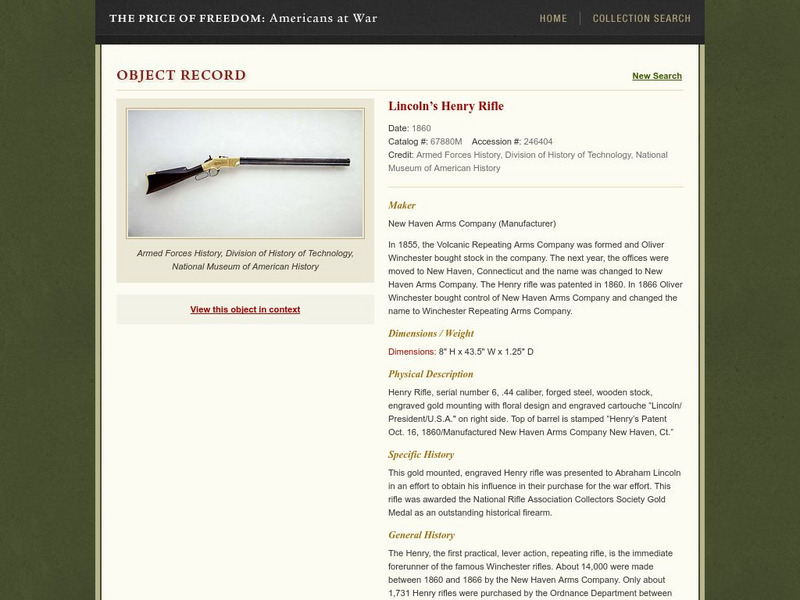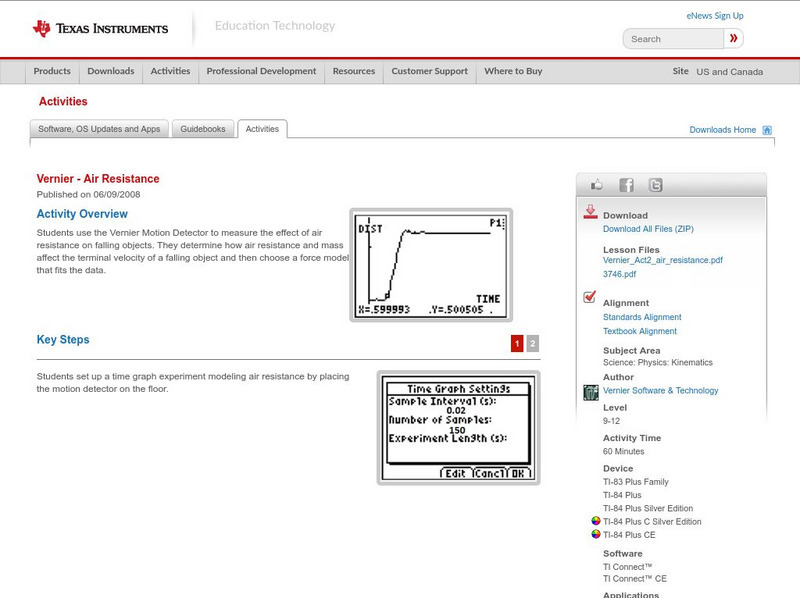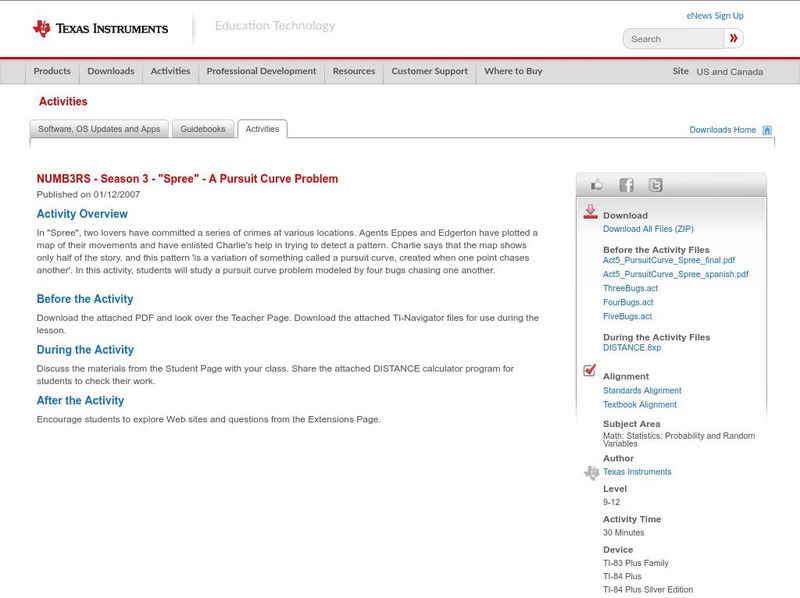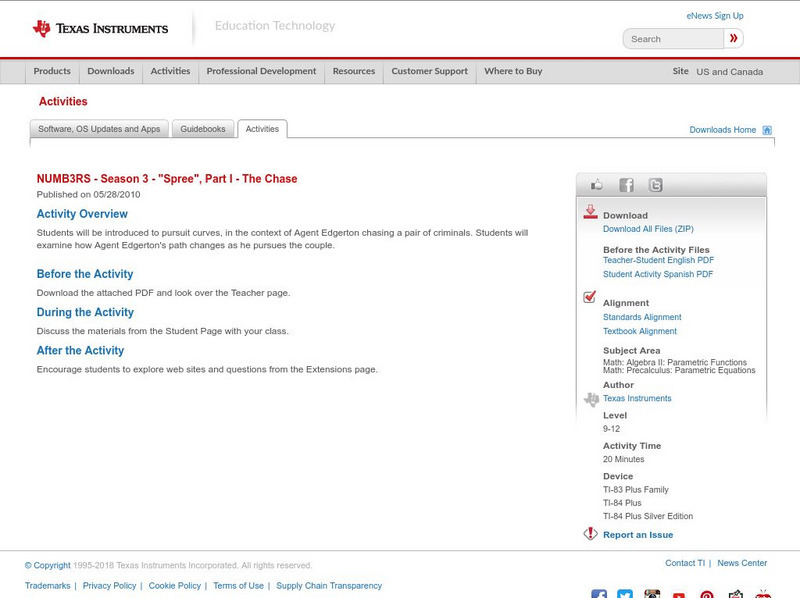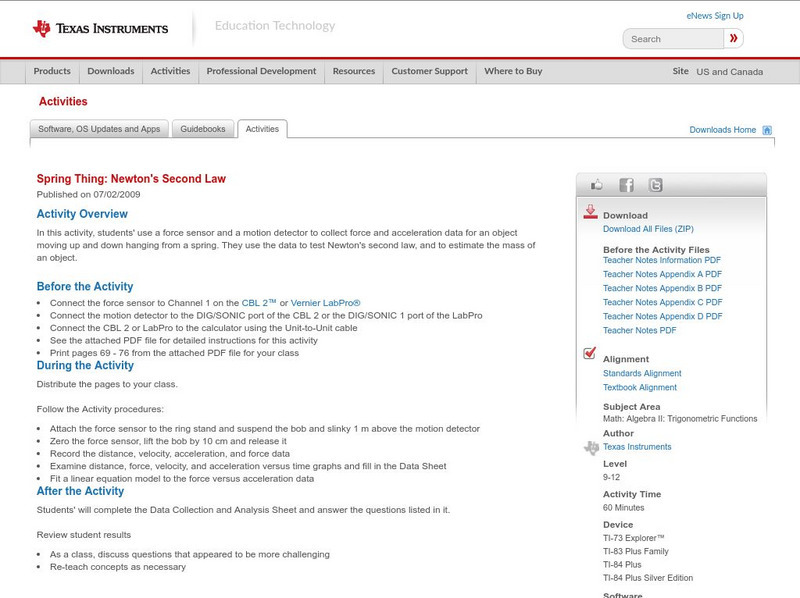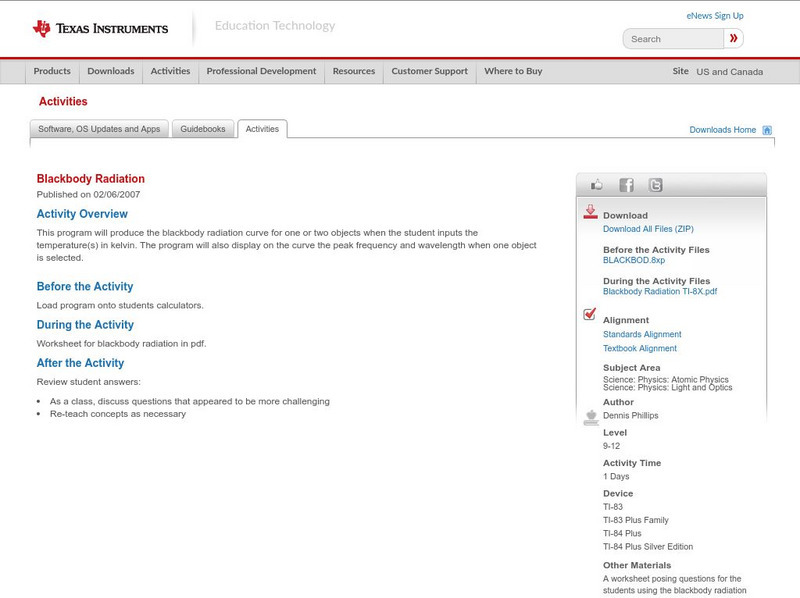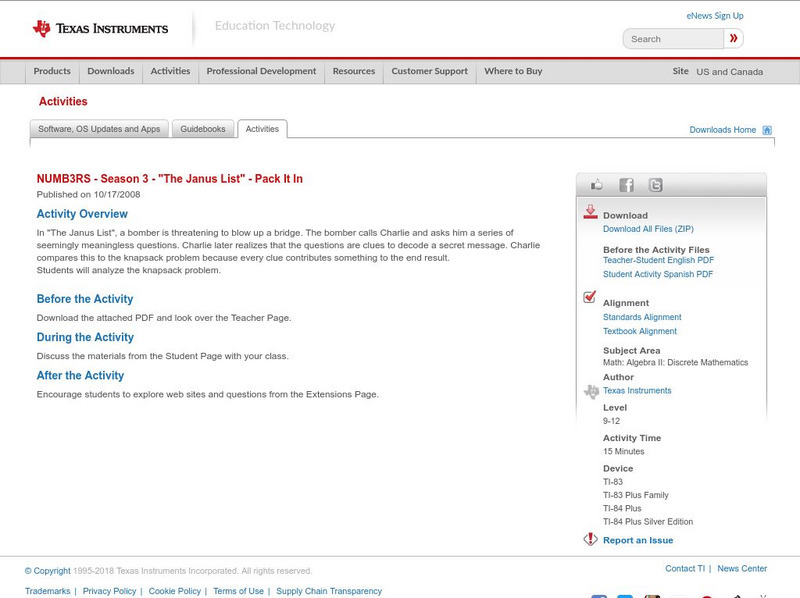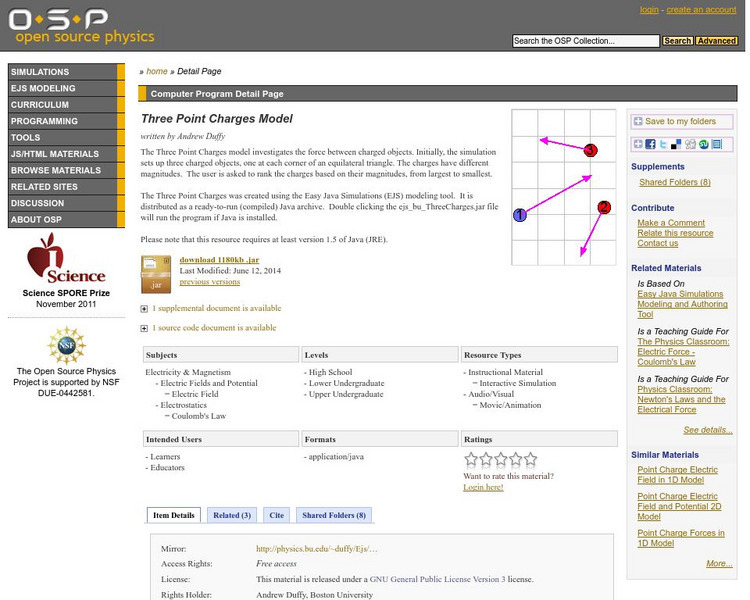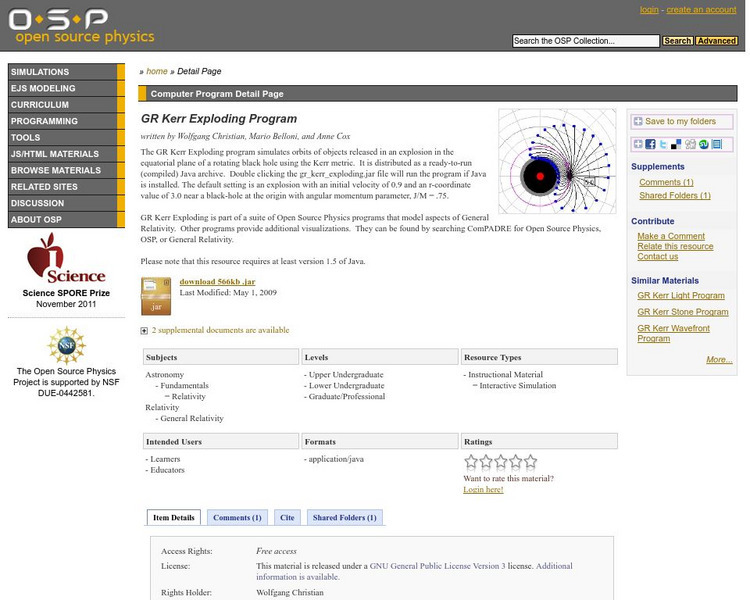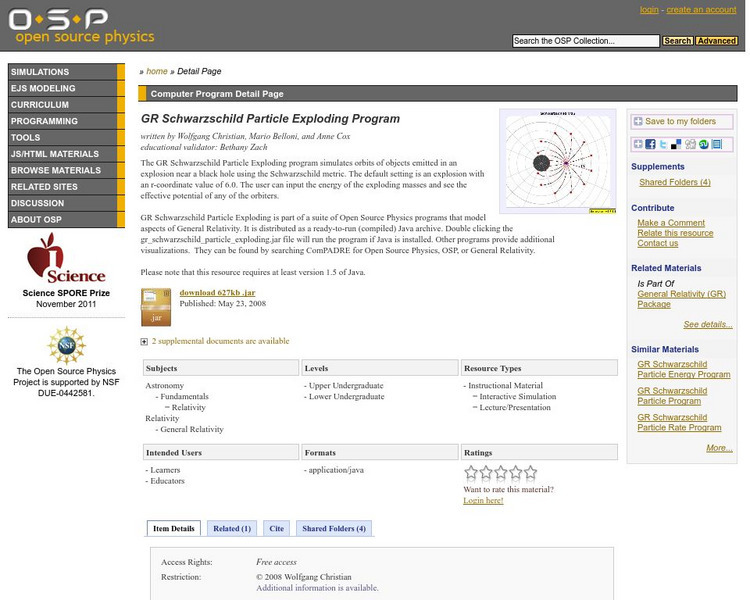Alabama Learning Exchange
Alex: It's in the Bag
This lesson is a unique and fun way to review perimeter, angles, and types of adjectives. Students pick an object from the classroom that will fit in a paper lunch bag. They investigate their object and fill in the attached sheet. You...
Alabama Learning Exchange
Alex: Cosmic Measurements
In this lesson, students will use hands on inquiry in cooperative learning groups to understand, develop and analyze common measurements used by astronomers. Students will use common objects such as straws, twizzlers, or toothpicks to...
American Association of Physics Teachers
Com Padre Digital Library: Open Source Physics: Anisotropic Oscillator Model
In this simulation an object is attached to two strings under tension on opposite sides of it. The object's starting position and the strings' lengths can be altered. The path of the object when it is released is traced on an...
Smithsonian Institution
National Museum of American History: Price of Freedom: Lincoln's Henry Rifle
View the museum object record for a Henry rifle given to Lincoln at the start of the Civil War. Record includes a history of the firearm, making note of its design as the inspiration for the famously successful Winchester rifle that came...
Texas Instruments
Texas Instruments: Air Resistance
Students use the Motion Detector to measure the effect of air resistance on falling objects. They determine how air resistance and mass affect the terminal velocity of a falling object and then choose a force model that fits the data.
Texas Instruments
Texas Instruments: Numb3 Rs: A Pursuit Curve Problem
Based off of the hit television show NUMB3RS, this lesson introduces students to pursuit curves, in which objects follow seemingly awkward paths due to other objects chasing it. In this lesson (which is technology intensive), students...
Texas Instruments
Texas Instruments: Numb3 Rs: The Chase
Based off of the hit television show NUMB3RS, this lesson has students develop the concept of pursuit curves, in which one object moves according to the movements of another object. This lesson is framed in the context of an officer...
Texas Instruments
Texas Instruments: Spring Thing: Newton's Second Law
In this activity, students' use a force sensor and a motion detector to collect force and acceleration data for an object moving up and down hanging from a spring. They use the data to test Newton's second law, and to estimate the mass...
Texas Instruments
Texas Instruments: Finding the Shortest Path
Students discover the shortest distance light travels from an object to the human eye, as the light from the object reflects off a single mirror. In the process they learn about reflection in a line, congruent angles, angle bisectors,...
Texas Instruments
Texas Instruments: Numb3 Rs: Clearing All Obstacles
Based off of the hit television show NUMB3RS, this lesson has students modeling a mock food fight using projectile motion. This lesson is very technology-intensive, and a CBR2 is used to measure the velocity of an object so that it's...
Texas Instruments
Texas Instruments: Blackbody Radiation
This program will produce the blackbody radiation curve for one or two objects when the student inputs the temperature(s) in kelvin. The program will also display on the curve the peak frequency and wavelength when one object is selected.
Texas Instruments
Texas Instruments: Falling Down
In this activity, students will determine the average speed of a falling object. They will observe whether or not changing the mass and keeping the same shape have an effect on the average speed of the object.
Texas Instruments
Texas Instruments: An Inclined Plane
In this activity, Students can use a Force Sensor to measure the force needed to lift an object and the force needed to pull the same object up an inclined plane. They will also calculate work done and efficiency and make conclusions.
Texas Instruments
Texas Instruments: Numb3 Rs: Pack It In
Based off of the hit television show NUMB3RS, this lesson introduces students to the Knapsack Problem, a discrete mathematics situation in which a knapsack is to be filled with a series of objects, each with various weights, sizes, or...
Texas Instruments
Texas Instruments: Estimation and Precise Measurement
Students will estimate various dimensions of objects located in a classroom. After estimations are completed, students will measure objects using appropriate measuring techniques for preciseness.
American Association of Physics Teachers
Com Padre Digital Library: Open Source Physics: Three Point Charges Model
In this simulation, investigate the force between charged objects. Rank three charged objects of different magnitudes, then create a method to determine the ranking of the charge magnitudes. Finally, devise a new method of determining...
American Association of Physics Teachers
Com Padre Digital Library: Open Source Physics: Gr Kerr Exploding Program
When an explosion occurs in the equatorial plane of a revolving black hole objects are released. This simulation illustrates the orbits of those objects in Kerr metric.
American Association of Physics Teachers
Com Padre Digital Library: Open Source Physics: Particle Exploding Program
Take a look at general relativity with this science simulation illustrating orbits of objects that are the result of an explosion near a black hole measured in Schwarzschild metric. Users are able to adjust the energy from the exploding...
American Association of Physics Teachers
Com Padre Digital Library: Open Source Physics: Sliding Down an Incline Plane
Here is a simulation demonstrating an object placed on an inclined plane. The user will vary the slope of the plane to see the relationship the slope has on the gravity of the object and the static friction.
Texas Instruments
Texas Instruments: What's the Scale?
The objective of this lesson is to have students determine the scale of a model when compared to the actual object. They will measure parts of the actual object and then compare the corresponding part of the model to determine the scale...
Alabama Learning Exchange
Alex: Circling Around
Students will calculate the diameter, circumference, and ratio of a real world object. Students will create an electronic slideshow to illustrate the process of determining the diameter, circumference, and ratio of these objects.
Alabama Learning Exchange
Alex: Is It Really That Big?
Just how tall is that object? In this lesson, students will participate in an outdoor group activity using shadows to extend their knowledge of proportions to solve problems dealing with similarity. The cooperative learning groups will...
Alabama Learning Exchange
Alex: Soaring With Literary Elements and Devices
In this lesson, students will observe literary elements and devices in a variety of chapter books. Students will be paired with a partner and allowed to choose one book to identify literary elements. Using digital cameras and a computer,...
Alabama Learning Exchange
Alex: Geometric Shadows
Learners will identify objects as translucent, transparent, or opaque. Upon seeing the shadow of the opaque object, students will identify the geometric figure created by the shadow.This lesson plan was created as a result of the Girls...



